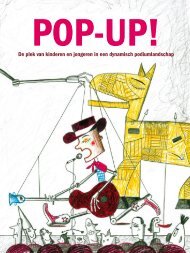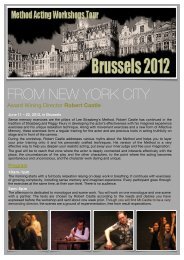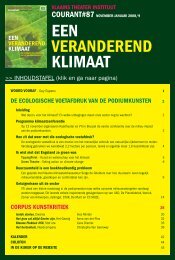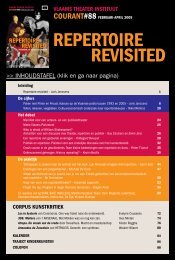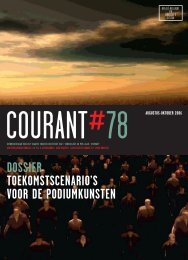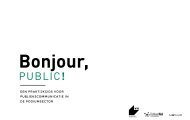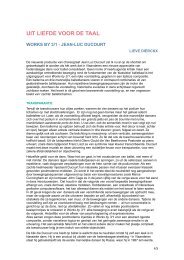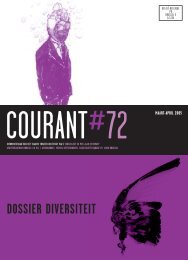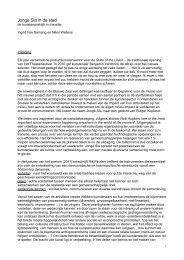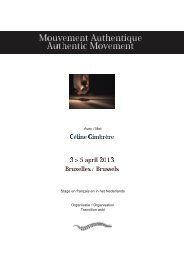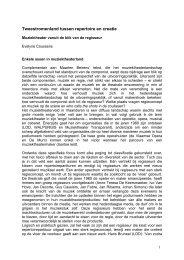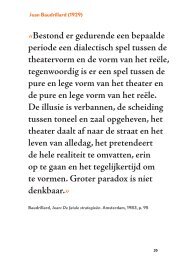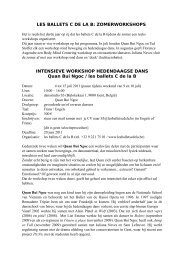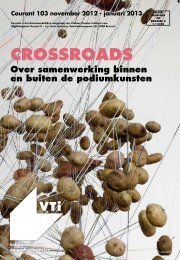Create successful ePaper yourself
Turn your PDF publications into a flip-book with our unique Google optimized e-Paper software.
josse de pauw<br />
<strong>De</strong> <strong>Pauw</strong> to follow the rehearsals of Brigitje as a coach. It is<br />
notable that in theatre criticism and chronicles, <strong>De</strong> <strong>Pauw</strong> is only<br />
sporadically mentioned alongside such companies as<br />
Maatschappij Discordia (a loyal guest at Kaaitheater), Tg Stan<br />
(Matthias <strong>De</strong> Koning was a supervisor of the company’s first productions<br />
together with <strong>De</strong> <strong>Pauw</strong>), Cie <strong>De</strong> Koe and Dito’Dito.<br />
Nevertheless, in Usurpation there was already close collaboration<br />
with Mieke Verdin (now with Dito’Dito). <strong>De</strong> <strong>Pauw</strong>’s choice<br />
of Frank Vercruyssen and Willy Thomas (Dito’Dito and often as<br />
a guest at Tg Stan) for Het Kind van de Smid possibly says more<br />
about the relationship between <strong>De</strong> <strong>Pauw</strong>’s artistic outlook and<br />
that of other companies. On the occasion of the tenth anniversary<br />
of Tg Stan in <strong>De</strong>cember 2000 and the associated festive programme<br />
in which several ‘like-minded performers’ appeared, <strong>De</strong><br />
<strong>Pauw</strong> was also one of the invitees. He performed W.H. Auden’s<br />
monologue Herodes, which contributed to the development of<br />
Larf. The affinity (let’s call it a similar colour rather than an<br />
explicit resemblance) is to be found primarily in a similar attitude<br />
to acting and the speaking of lines. The actor’s performance is<br />
transparent, and the person is clearly to be sensed behind the<br />
character. An important element is ensemble work, in which the<br />
actors’ pleasure in performing also remains palpable. Content<br />
and language are the most important means of communicating<br />
with each other and with the audience. Technical tours de force,<br />
a superfluous set and any form of aest<strong>het</strong>ics that hinders direct<br />
contact with the audience are avoided. Instead, space is given to<br />
playful irony, rhythm and deliberate speech. At its heart is the<br />
emancipated actor, who is himself responsible for what he wants<br />
to tell. The absence of a real director (there usually isn’t one, at<br />
most a coach/questioner) is closely connected to this. A great<br />
many differences can also be pointed out, of course: <strong>De</strong> <strong>Pauw</strong><br />
likes to use a sort of sensual Flemish in which he cherishes every<br />
word on his lips before he lets go of it. In contrast to the sharp,<br />
rapid dialogues of Tg Stan and Cie <strong>De</strong> Koe, he gives us guarded,<br />
meticulously timed speech whereby the poetry of the written<br />
word also comes to the surface.<br />
With Weg in 1998 and Larf in 2000, <strong>De</strong> <strong>Pauw</strong> received the<br />
recognition as a performing artist that he deserved. The selection<br />
of the first piece for the 1999 Dutch-Flemish Theatre Festival,<br />
and the award, for both pieces, of the Océ Podium Prize in 2000,<br />
are the most obvious expressions of acclaim. Several days after<br />
54 / Kritisch Theater Lexicon - 14 e - August 2001<br />
structural and artistic context<br />
the prize was awarded, <strong>De</strong> <strong>Pauw</strong> said, ‘I received this prize for<br />
my plays Weg and Larf, but I also see it as a crowning of my<br />
career. I really had the feeling that everyone was pleased to see<br />
me get it. I have quite often received unsightly little statues, but<br />
money – real money – is after all the most solid proof of appreciation<br />
one can get.’ 24 The publication of virtually all <strong>De</strong> <strong>Pauw</strong>’s<br />
writing in the book Werk, extremely well received by the literary<br />
critics, has also brought him much attention in 2000.<br />
One reason why <strong>De</strong> <strong>Pauw</strong> has in the past been honoured for<br />
his artistic work, but is seldom named on the list of recent theatre<br />
innovators, is that he operates largely alone. Because he has<br />
never had his own company, collective or theatre group, (except<br />
for Radeis), he is more often seen as an individual in a changing<br />
landscape. His recent appointment as artistic director of HetNet<br />
in Bruges may change this. Just like Tom Jansen and Dirk<br />
Roofthooft, <strong>De</strong> <strong>Pauw</strong> belongs to that group of actors in the Low<br />
Countries who have acquired a respected position of their own<br />
on the basis of their highly personal approach to and mastery of<br />
the profession. Association with a company, a particular director<br />
or a successful production is of secondary importance. To the<br />
outside world, <strong>De</strong> <strong>Pauw</strong> is in the first instance a versatile artist<br />
who writes, acts, makes films and plays, and all in a number of<br />
semi-casual working relationships. The fact that, precisely as a<br />
result of this position, he is constantly involved in the margins of<br />
theatrical renewal (most clearly in internationalisation, multidisciplinarity<br />
and the emancipation of the actor) usually goes unnoticed.<br />
As an artist, <strong>De</strong> <strong>Pauw</strong> has never presented himself as an<br />
innovator. He enthusiastically joins in the changes, or encourages<br />
them, and then soon completely changes direction. Throughout<br />
his twenty-year career, this artistic integrity, combined with the<br />
authenticity of his story, has been the most important thread<br />
recognised by critics, play-makers and audiences. The cancellation<br />
of two productions (Wolf, planned for 1985, and <strong>De</strong><br />
vrouwen, for 1995) because proper collaboration could not be<br />
guaranteed, only serves to reinforce this. <strong>De</strong> <strong>Pauw</strong> is seen in the<br />
first place as an honest, independent and, above all, talented<br />
artist. Someone who prefers searching to knowing, probing to<br />
grasping and growing in the course of time to running in the<br />
race. In his introduction to Cesare Pavese’s text in Etcetera – the<br />
piece that is also quoted in the first programme book at HetNet<br />
– Josse <strong>De</strong> <strong>Pauw</strong> ends his description of urban life with the fol-<br />
55 / Kritisch Theater Lexicon - 14 e - August 2001



